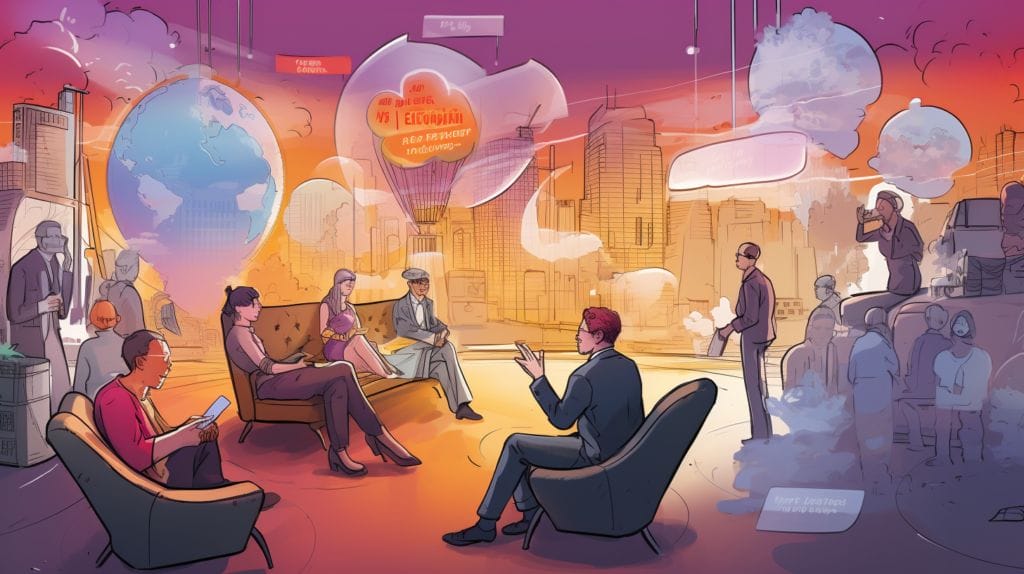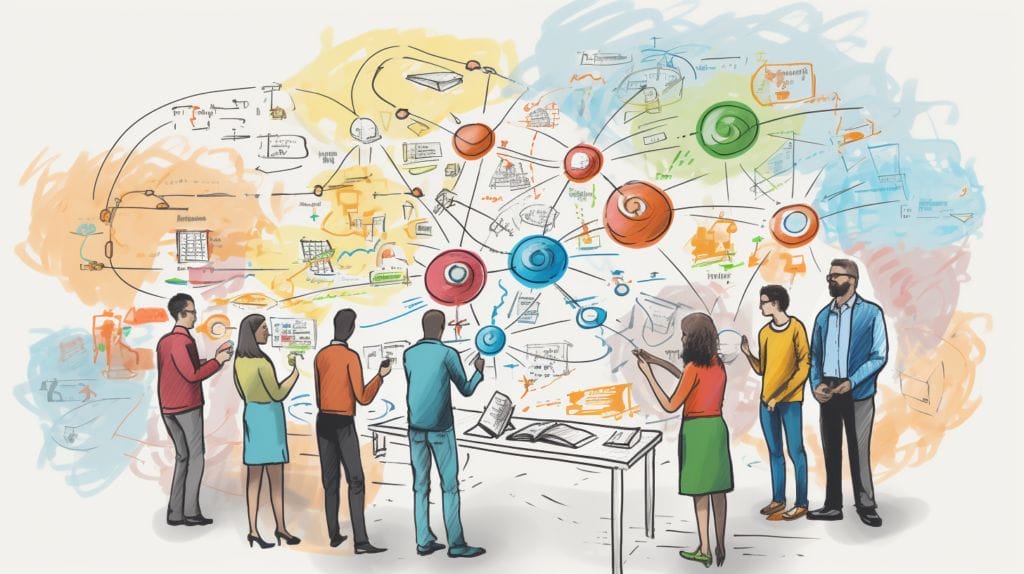Hello everyone! I’m embarking on my journey into the realm of social objectives. Does anyone have an example of a social mission they could illustrate? I’m eager for us to explore the importance of these ambitions and talk about strategies to nurture them.
I’ll be sharing real-life examples to help you grasp the concept better.
You’re in the right place if you’re curious about how social objectives can influence your perception and overall well-being.
Stick around, as I’ll also be sharing strategies to help you achieve these goals.
Let’s uncover the power of social objectives together!
Key Takeaways
- They are objectives set to improve interactions with others or contributions to society.
- Achieving them can boost self-esteem and a sense of belonging.
- They enhance relationship building, foster cooperation and leadership, and promote peaceful interactions.
- Setting social goals involves identifying areas for improvement, setting meaningful and achievable goals, taking action, and celebrating milestones.
Decoding Social Goals: What Are They and Why They Matter

Let’s kick off this discussion by defining what social goals are.
Next, we’ll examine why they’re crucial for our well-being.
Defining Social Goals
I’m going to help you understand what social goals are and why they’re important. We set objectives to improve our interactions with others or our contributions to society.
They can range from personal changes, like becoming a better listener, to broader endeavors, like promoting environmental consciousness. Defining it clearly is crucial, as it is the first step to establishing and reaching goals effectively.
Charity and donation are essential components of social objectives. By donating to a cause you are passionate about, you can contribute to addressing social problems such as poverty, hunger, and discrimination. Setting measurable goals to help these social issues is vital to making a meaningful impact.
Here are some social objectives illustrations for better understanding:
| Social Goals | Description | Why It Matters |
| Becoming a better listener | Improving active listening skills | Enhances communication and relationships |
| Volunteering in a community | Offering time and skills to help others | Encourages empathy and altruism |
| Promoting environmental consciousness | Advocating for sustainable practices | Benefits society and the planet |
The Importance of Social Goals for Our Welfare
As we delve deeper into social goals, it’s essential to comprehend their significance, not just for preventing societal insecurity and fostering harmony but also for our personal welfare.
Social objectives are important because they guide our interactions, shape our personality, and impact our mental health.
When we set goals that aim to improve our relationships and contribute to society, we engage in behaviors that foster positive interactions and build strong relationships.
Attaining social objectives can boost our self-esteem and sense of belonging. Volunteering at a soup kitchen or helping a friend in need can bring a sense of purpose and fulfillment.
It significantly contributes to our welfare and overall satisfaction with life. It’s a lofty aim, but it’s one that can have a profound fire on the outcome of our lives. By curbing our insecurities, we reserve a place for happiness and contentment.
In the pursuit of your social objectives, make it a priority to find your true self and devote time to what aligns with your preference. This will be your starting point towards a more fulfilling life.
Exploring the Link Between Social Goals and Social Skills
I’ll be focusing on the correlation between social objectives and the development of social abilities in this part of the discussion. The underlying link between them is the process of goal setting.
Here is the illustration:
| Social Goals | Social Skills Developed | Importance |
| Sharing with others | Communication, Empathy | Enhances relationship building |
| Participating in group activities | Teamwork, Leadership | Fosters cooperation and leadership |
| Resolving conflicts peacefully | Problem-solving, Negotiation | Promotes peaceful interactions |
From Theory to Reality: Examples of Social Goals

Now, let’s move from theory to real-life examples of social objectives.
We’ll look at goals centered on enhancing our social lives, ways to alleviate social unease, and how we can make a difference in our communities.
These are all tangible illustrations of social objectives that can profoundly impact our lives and the world around us.
Setting a Goal to Enhance Social Life
I’m eager to share practical examples of setting goals that can significantly improve your social network. Setting goals can improve your social life, social abilities, and more meaningful social engagements.
- Set a goal to meet new people: To do this, you could aim to attend a social event at least once a month. It’s a great way of making friends and expanding your social network. This can also give you the opportunity to feel more confident in social settings.
- Improve communication skills: This could mean taking a public speaking course or practicing active listening. Effective communication is essential in all social engagements. It can also inspire more meaningful conversations and connections.
- Seek out shared interests: Joining a club or group related to your hobbies can enhance your social network, as you’ll meet like-minded people and have a common topic of conversation. This can help you find like-minded individuals and build lasting friendships.
Establishing social objectives can be a game-changer for your social relationships.
It’s important to remember that the ranking of these goals can be subjective, but they can significantly impact your social network.
In the end, your final thoughts on your social objectives will depend on your unique experiences and what you set aside to prioritize.
And remember to respect copyright and intellectual property when sharing experiences and advice with others.
Alleviating Social Anxiety as a Social Goal
While we’ve talked about enhancing social networks, it’s also crucial to consider how setting a goal to alleviate social unease can transform one’s social experiences from stressful to enjoyable.
Alleviating social unease as a social goal is a prime social objective example that promotes personal growth and enhances the quality of social engagements.
The following table provides a breakdown of this goal-setting process:
| Goal Setting Stage | Description | Example |
| Identification | Recognize social anxiety as a barrier | Feeling uncomfortable in social settings |
| Strategy Formation | Develop tactics to manage anxiety | Practice mindfulness, seek therapy |
| Implementation | Actively apply these strategies | Regularly attend social gatherings using coping strategies |
Pursuing personal social objectives like this can make a significant difference in one’s social network, turning it from a source of stress into a source of joy and fulfillment.
Making a Difference In Your Community as a Social Goal
As we shift focus, let’s explore ways to make a difference in your community can be a compelling social goal, and I’ll provide tangible examples to turn this theory into reality.
Embracing social responsibility, we can also talk about how making a difference through community service is a remarkable way to attain this goal. This social objectives example isn’t just about personal growth but also about enhancing the lives of those around us.
- Organize a neighborhood cleanup: This improves your immediate surroundings and fosters a sense of community.
- Volunteer at a local shelter: You provide essential support to those in need.
- Start a community garden: This promotes sustainability and provides fresh produce for your community. Suppose you are fortunate to have the space. In that case, it’s a wonderful way to able to find resources and contribute positively to your neighborhood.
The Process of Setting Social Goals

Establishing social objectives begins with identifying areas in your social network that need improvement.
I’ll provide a step-by-step guide to ensure your goals are meaningful and achievable.
How to Identify Areas for Improvement in Your Social Life
Often, it’s crucial to consciously assess my social engagements to pinpoint areas that may need improvement. Whether you’re shy, socially awkward, or want to improve your social network, it’s important to identify areas for improvement.
To do this, I usually:
- Reflect on my past social experiences: Are there instances where I felt uncomfortable or out of place? What could I’ve done differently?
- Seek feedback from trusted friends: They can provide valuable insights into how I come across in social settings.
- Identify specific social abilities that I’d like to enhance: Do I struggle with initiating conversations, keeping them going, or expressing empathy?
Establishing social objectives helps me to continually improve my social engagements and enrich my overall social experience.
Step-By-Step Guide to Setting Meaningful Social Goals
So, how do I go about setting meaningful social objectives, and what steps should I follow to ensure they’re effective?
Here’s a step-by-step guide to setting meaningful social objectives:
- First, identify what’s a social goal example that resonates with you.
- Next, create goals that align with your values and passions. This will motivate you to commit and make an impact.
- Further, be specific about these goals. Instead of saying, ‘I want to help people,’ say, ‘I want to volunteer at a homeless shelter weekly.’
- Then, research the social causes you’re interested in and understand how you can contribute.
The Role of Motivation When Setting Social Goals
Motivation plays a crucial role when establishing social objectives, and it’s often the driving force behind our commitment to attaining them.
The role of motivation can’t be underestimated, and it can be the difference between success and failure. Understanding the role of motivation is key to the process.
- Motivation provides the initial spark to set the social goal. That inner drive pushes us to make a change or reach a milestone.
- It aids in maintaining the momentum over time. Even when faced with setbacks, motivation can help us stay on track.
- Finally, motivation fuels the perseverance needed to reach the social goal. It’s the force that keeps us going when the journey gets tough.
Strategies to Achieve Your Social Goals

Now, let’s talk about strategies for reaching social objectives.
We’ll examine how you can overcome social loneliness, improve your social abilities, and make the most of social networking platforms.
These strategies can help you reach your goals more quickly and efficiently.
Overcoming Social Loneliness
I will share some practical strategies that can help you overcome social loneliness and reach your social objectives.
It’s normal to feel lonely sometimes, but we shouldn’t let this transient feeling hinder us from reaching our social aspirations.
Here are some strategies to overcome social loneliness:
- Volunteer: Volunteering connects you with people with the same passion and purpose. It’s a great way to socialize and make new friends.
- Join clubs or organizations: This introduces you to a new network of friends with similar interests.
- Online communities: The internet offers various platforms to find and interact with like-minded individuals.
Tips for Improving Social Skills
While it’s crucial to understand loneliness and its impacts, we’ll now move on to exploring some practical tips for improving your interpersonal skills and working toward your social objectives. One powerful strategy is finding a mentor who excels in social exchange and can guide your growth.
Here’s a quick table to break down some strategies that can boost your interpersonal skills:
| Strategy | Description |
| Find a Mentor | A mentor can provide guidance, share their experiences, and offer advice to improve interpersonal skills. |
| Practice Active Listening | Active listening promotes understanding, validates feelings, and fosters meaningful exchange. |
| Work On Perception | Understanding how others perceive you can help refine your social skills and exchanges. |
Implementing these strategies can be an effective way to improve your social skills and, ultimately, reach your goals.
Utilizing Social Networking Platforms
One can effectively use social networking platforms to reach social objectives. These platforms can educate, inspire, and motivate individuals, fostering an environment conducive to social growth and development.
They can also be pursued by:
- Creating engaging content that resonates with your audience and encourages interchange. It could be posts that educate, inspire, or motivate your followers.
- Building genuine relationships with your online community. Engage them in meaningful conversations, respond to their comments, and show appreciation for their support.
- Utilizing the features each platform offers. Whether it’s Instagram stories, Facebook Live, or Twitter threads, these tools can enhance your social engagement efforts.
The Impact of Achieving Social Goals on Perception and Well-being

Attaining social objectives can be transformative, and it’s time to explore how.
We’ll look at the connection between these goals and our mental welfare.
We’ll also discuss the role of these goals in shaping our views and self-image.
Before and After: The Transformation that Social Goals Can Bring
I’ve witnessed firsthand how setting and achieving social objectives can dramatically transform a person’s worldview and significantly improve their overall welfare. People with goals often experience a ‘before and after’ transformation that’s truly inspiring.
Here’s a quick look at some social objectives examples and their impact:
- Volunteering at a local shelter can change one’s views of homelessness, making them more compassionate and motivated to improve the world.
- Organizing community clean-ups can enhance a person’s sense of responsibility towards the environment.
- Mentoring a young person can amplify self-confidence and foster a sense of purpose in both the mentor and the mentee.
In essence, they transform individuals and contribute to societal change.
Social Goals and Mental Welfare: The Link
Let’s delve into the profound connection between pursuing social goals and one’s mental welfare.
When we set out to reach social objectives, we’re looking to get involved and make the world a better place. It isn’t just altruistic; it also benefits our mental welfare.
Helping others can provide a sense of purpose and fulfillment that’s hard to match. It can boost our mood, reduce stress, and even improve our self-esteem. So, when we take action to help others, we’re also helping ourselves.
The link between social objectives and mental welfare is a powerful one, reminding us that our actions don’t just impact the world around us; they also shape our inner world.
The Role of Social Goals in Shaping Our Perception and Image
In striving for social objectives, I’ve noticed how they shape not only my views of the world around me but also my self-image, and they significantly impact my overall welfare. The role of these goals is profound, subtly influencing our exchanges and decisions.
They help in shaping our views. They guide our understanding and interpretation of social situations, molding our perspective.
These social goals play a significant role in forming our self-image. We build a sense of identity and self-worth by striving to reach personal social goals.
Achieving it positively affects our welfare. It provides a sense of fulfillment, boosts confidence, and enhances our overall life satisfaction.
Thus, they are pivotal in shaping our views, image, and welfare. You can also use them to create critical social goals for your personal development and social interactions.
Frequently Asked Questions
What Are Some Common Misconceptions About Social Goals?
One common misconception is that social objectives are only about making friends. They’re broader, encompassing things like improving communication skills or promoting social justice. They’re not always easy to measure, but they’re crucial.
How Can Social Goals Influence One’s Career Choices and Professional Development?
They can significantly influence my career choices and professional growth. They guide me towards roles that align with my values, fostering satisfaction and motivation while building meaningful connections in my field.
Can Social Goals Change Over Time? If yes, How Can One Adapt to These Changes?
They can evolve. I adapt by regularly reassessing my priorities, staying open-minded to new perspectives, and remaining flexible and resilient in changing circumstances and opportunities.
How Does Culture Impact the Formulation of Social Goals?
Culture significantly influences my social objectives. It shapes my values, perceptions, and behaviors, which directly impact the goals I set. Adapting to cultural changes can be challenging but crucial for goal evolution and accomplishment.
Are There Specific Social Goals More Beneficial for Certain Age Groups?
Particular social objectives are more beneficial for specific age groups. For instance, young people often benefit from goals around forming healthy friendships, while older adults might focus on community involvement.
Conclusion
In conclusion, setting social goals can significantly enhance our lives. They help us connect with others, improve our communication skills, and boost our overall welfare.
We can make significant progress with strategies like breaking goals into manageable steps.
In the end, achieving our social objectives changes how others perceive us and how we perceive ourselves.
Remember, it’s all about taking one step at a time toward greater social fulfillment.

